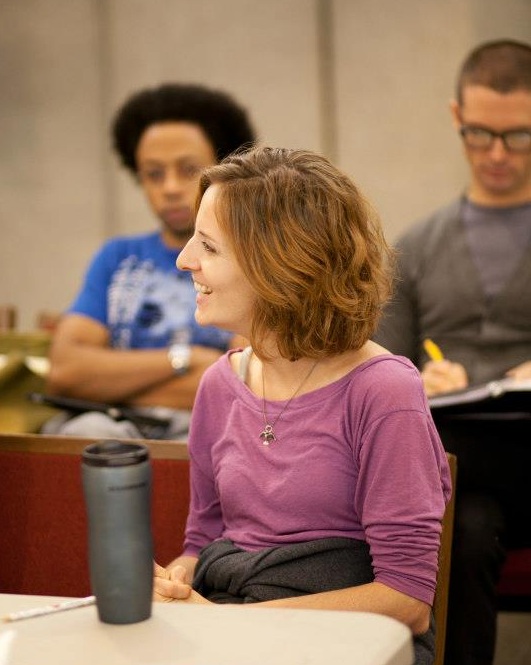Write What You Know?
(This blog was originally published by The Public Theater.)
I was pursuing an MFA in Directing when I began to suspect that writing might be my true calling. I can identify the very moment, actually. I was at a writer’s retreat that I’d be invited to based on theimpression one of my plays had made on the retreat’s director. After a week of the typical readings, workshops, and feedback sessions, the retreat director, Bryan Coley, led the writers onto a stage and proceeded to ritualistically wash our feet. I was completely stunned, and when it was my turn to approach the wash-basin, my legs shook, and when Bryan began to wash my feet, I broke down sobbing.
I returned to my graduate program at Baylor to attend a playwriting seminar by Horton Foote, whose work I had appreciated for some time. I sat with my newfound sense of destiny, ready to soak in all the wisdom that this revered theater sage might offer, and I remember my heart breaking every time he repeated these words: “write what you know”. Of course, “write what you know” does not belong to Horton Foote; it’s an age-old piece of writing wisdom. But Foote, with all his plays about the same small town of Harrison, Texas, seemed to have found the “write what you know” sweet spot. And I began to wonder, in light of Foote’s wisdom and experience, if I could ever be a playwright, because no town was my town—I didn’t know anything.
I’m a third culture kid that never belonged anywhere I lived. Though I am Caucasian, I was born in the Philippines and raised in various parts of Asia. When, in my teens, my family returned to the United States, I felt even more out of place than I did living overseas. I never had a town like Foote’s–one that I knew inside and out like he did. The culture most think is mine, because I am white and well-educated, isn’t really my culture—I didn’t listen to the music they listened to, watch the same T.V. shows, play with the same toys, wear the same clothes. Actually there is no culture that did those things with me, because even the children I grew up around in China or Hong Kong didn’t grow up as I did—an American in a foreign land. How do you write what you know when everything you know is from the point of view of an outsider?
I’ve run into this quagmire over and over again in my writing. The play I wrote during my time in the EWG was about three heroic Nigerian women who stood up to the Oil Company in their village. I don’t know Nigeria. I know some Nigerians who were part of this story, but I’m not one of them. Similarly, the play I wrote that got me into the EWG is a play about a Palestinian priest who stayed to protect the Church of the Nativity in Bethlehem from Palestinian gunmen taking refuge there during an intifada. I’ve been to Bethlehem, but I don’t know it. I’ve often wondered: am I writing the wrong stories?
A few years after moving to NYC I took a playwriting class from Arthur Giron at Ensemble Studio Theater. It was the usual structure—students bring in work and get teacher and peer feedback. But one day in class Arthur challenged us with a question about truth. An uncomfortable, even semi-painful energy materialized in the room. The writer across the table from me stiffened and balked, “Truth! What does that have to do with playwriting? Why should I care about truth?” Arthur turned his neck without moving his body, and his words froze us in our seats. “Because if you don’t, you will go to hell,” he said, his face stone serious. My stomach dropped, and I knew in my gut that he was right.
I recently had a revelation that has allowed me to connect these three definitive events. Foote was right—write what you know. Write what you know. Don’t write what you think. Don’t just write well. Write what you know to be true about this world, this thing we’re doing, this living. Arthur was also right–it has to be true, not in the journalistic sense, but in the meaningfulness of life. That part can’t be a lie, because if it is it’s the worst kind of lie—deliberate and pre-meditated. Bryan was right, too—there’s a sacredness about it all that requires a willingness to let others touch our dirt and cleanse our filth no matter how humbling that may be.
Write what you know, what you know more than anything else, what you know more than anyone else. I’m sure I’ll fall short of this most of the time. But the times I don’t, I’ll do good work. And in those times I’ll get the satisfaction of knowing I’ve fulfilled my calling as a writer.
